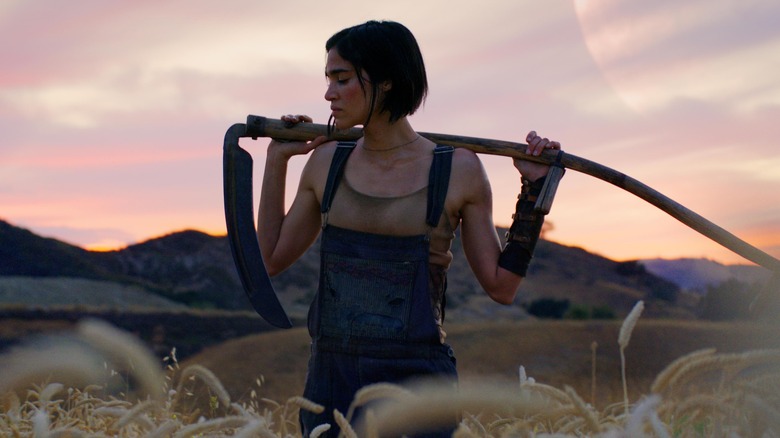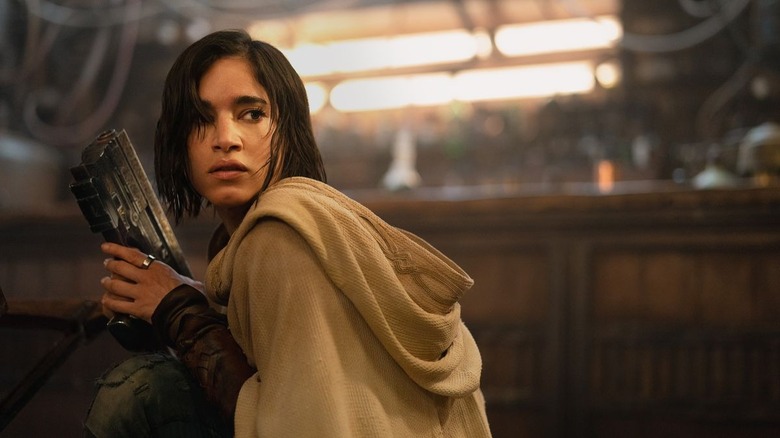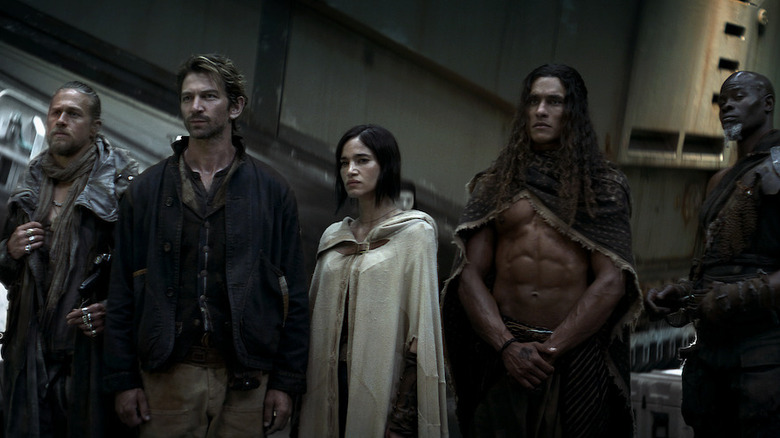Rebel Moon: Part One Review - Zack Snyder's Take On Star Wars Is Fun, But Not Perfect
- Unashamedly rips off "Star Wars" and "Seven Samurai" and is all the better for it
- Some of the most thrilling set pieces in Zack Snyder's filmography
- Feels like a thematic companion to his DC movies in how it interrogates our relationships to screen heroes
- The utilization of sexual violence as a plot motivation feels as lazy and uncomfortable here as it did in "Sucker Punch"
- The bloodlessness of the battle scenes will make you wish it was a hard-R rated movie
Zack Snyder has made it no secret that the origin of his budding franchise "Rebel Moon" was a screenplay for a "Star Wars" spin-off he abandoned in development hell a decade ago. But even if you didn't know that context, you'd be safe to assume this would be the case based on the movie itself: a tale of a band of intergalactic outsiders teaming up to fight back against a tyrannical regime, complete with lightsabers and a bounty hunter we first meet in a cantina. It is unashamedly, unapologetically indebted to George Lucas' space saga, with the only cosmetic difference at first appearing to be the amount of grit with which this story is told.
Perhaps the biggest triumph of "Rebel Moon: Part One — A Child of Fire" is that, despite wearing its biggest genre influence proudly on its sleeve and mimicking many of its trademarks, it never feels derivative of it. This may be because Snyder is too distinctive a filmmaker to feel like he's simply copying somebody else's homework; the world-building is familiar on a broad scale, yes, but the specifics are far odder, not to mention riskier within a blockbuster Netflix is surely hoping will be watched by the whole family over the holiday season. It doesn't work entirely, but there's a thrill to seeing a movie operating on this scale that hasn't been sanitized within an inch of its life.
Seven Samurai in space
We open on the planet of Veldt, a remote, rural community at the very edge of the universe controlled by the despotic Motherworld government. It's this farming community where Kora (Sofia Boutella) has made her new home after fleeing from the Imperial Army, hoping to start a new life to atone for the sins of her past. But at the start of a crucial harvest season, that peace is threatened by the arrival of the army, who want to be given significant crops to help keep them fed and ready for battle at the galaxy's outer reaches, where they are hunting rebels. With the army intimidating the residents into a no-win situation — either supply them with all their crops, starving the farmers to death, or be killed on the spot — Kora realizes it's time to take action and fight for her adopted home, embarking on a quest across the galaxy to find other rebels who will help defend them from the Imperial fighters once they return.
If "Star Wars" was George Lucas' tribute to Akira Kurosawa's "The Hidden Fortress," then "Rebel Moon" is Zack Snyder's attempt to make a space opera out of another Kurosawa classic: "Seven Samurai." As with his other influences here, the director makes zero attempts to disguise the obvious parallels between both, finding something oddly liberating in laying out the ways he aims to adhere to a tried-and-tested storytelling formula. Naturally, it doesn't hold a candle to such a totemic influence, but it is an effective tribute, with the first act slowly building a sense of unrelenting dread as the farming community faces the biggest existential threat it's ever faced. Once again, the sign that the film was working for me was that I couldn't overlook the story it was mimicking but found myself drawn in and unnerved despite the familiarity.
It should be noted that the specific inciting incident that leads Kora to embark on her revenge mission will reignite a criticism rightfully leveraged at one of Snyder's earlier films, "Sucker Punch," through the way it portrays sexual assault. Like that effort, this isn't an R-rated movie — the bloodlessness of the otherwise effectively staged fight scenes might be the biggest flaw on the whole — but "Rebel Moon" is instead a PG-13 attempt at an audience-friendly blockbuster, which means that any attempts to do justice to the portrayal of such a consequential threat feel awkward.
Needs less grit
Luckily, there's none of the uncomfortable leering at the female protagonists here, which only made the attempts to allude to similar acts of violence in "Sucker Punch" disturbing for all the wrong reasons, but lazily using the threat of sexual violence toward a secondary character as a motivator for the protagonist still left me feeling uneasy. Yes, it directly leads to one of the best-staged fight sequences in the whole movie, but I can't help but feel that could have been set up with a far less intimidating threat if it were going to portray a substantial one this emptily. When a male character is nonconsensually sexually propositioned by an alien later on, it does feel like Zack Snyder acknowledging this criticism but coming up with the wrong solution. Making a male character a victim of sexual assault doesn't make its previous uses as a threat toward female characters any less ill-thought-through. It's used as empty shorthand to justify a character's revenge mission, with little afterthought to the victim.
It's the one aspect of "Rebel Moon" that proves jarring. Even the most surreal moments — Corey Stoll as the community's leader is introduced via a monologue encouraging everybody to go have sex to ensure a good harvest season — fit well within this slightly off-kilter take on a recognizable space western. That familiarity is what leads the film to the trait most distinctive of Snyder: how he explores hero worship both within the narrative and as a meta-interrogation of our relationship to such screen archetypes. Following his divisive take on "Watchmen," his DC films (and in particular, his iteration of Superman) mostly operated as examinations of how superheroes are treated as deities within their stories and the complications that arise when treating flawed beings as messiahs. "Rebel Moon" isn't as likely to turn off more casual viewers with its approach, but it does still repeatedly pause to make the audience ponder why they unquestionably react to certain archetypes as heroes.
Charlie Hunnam's Kai, a bounty hunter and pilot in the Han Solo mode — albeit with a dreadful Irish accent, the latest addition to the never-ending list of accents he can't pull off — is treated as a cocky, charismatic figure akin to Harrison Ford's beloved character upon arrival. Snyder seems confused as to how a character so clearly in it for himself could have become a defining screen hero, and so he aims to utilize Kai within his narrative as a corrective to that automatic assumption. "Rebel Moon" weaponizes your familiarity with "Star Wars" and its countless imitators, which proves far more effective at distinguishing this tale than the queasy attempts at grittiness.
It is undeniable that "Rebel Moon" can't be judged entirely on the back of this first part, with the cliffhanger making it all but apparent that this story doesn't work without the whole. What I can say is that "Rebel Moon: Part One — A Child of Fire" suggests this saga could be one of Snyder's greater blockbuster achievements to date, with thrilling spectacle and enough ingenious twists on a familiar formula that ensure it never feels derivative. There are missteps along the way, but this is a Snyder movie after all — his big swings never completely hit the mark, but there are few directors who would attempt so many within a movie on this gargantuan scale.
"Rebel Moon: Part One — A Child of Fire" has a limited theatrical run on December 15 and lands on Netflix on December 21.
If you or anyone you know has been a victim of sexual assault, help is available. Visit the Rape, Abuse & Incest National Network website or contact RAINN's National Helpline at 1-800-656-HOPE (4673).


